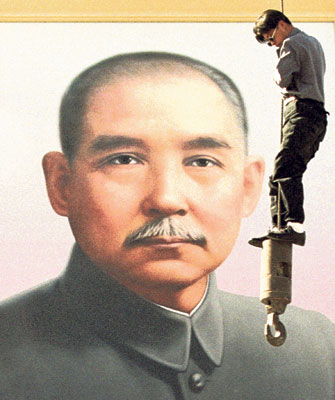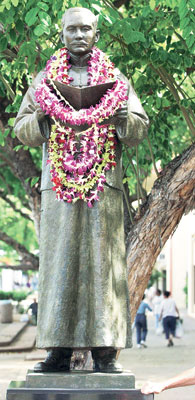Sun Yat-sen exhibit focuses on Hawaii influence

Sun Yat-sen’s statue near the Chinese Cultural Plaza is traditionally draped with lei on his birthday.

Taiwan marks the Republic of China’s centennial with a Honolulu photo exhibition about its Hawaii-educated founding father.

The founding father of modern China learned about democracy in Hawaii, and used the islands to raise money and support for political efforts that would lead to the overthrow of the Qing imperial government.
Now, Taiwan is using the centennial anniversary of the Republic of China’s founding to celebrate Sun Yat-sen’s connection to Hawaii. The Taiwanese government is sponsoring a photo exhibit at Honolulu’s City Hall this month that underscores the pivotal role the islands played in shaping Sun.
"His early education in Hawaii planted the seeds … for him later to become the father of modern China," said Paul Wen-liang Chang, the director general of the Taipei Economic and Cultural Office in Honolulu.
The exhibit, due to begin Wednesday, is expected to include a copy of a ledger page from Oahu College — as Punahou School was then called — showing Sun was charged $55 for sundries or school supplies and other items.
Illustrating how Sun repeatedly returned to Hawaii to drum up support for his work in China, the exhibit will feature an article from the front page of the Pacific Commercial Advertiser on Dec. 14, 1903, about a speech he delivered in Chinatown. It reports a crowd packed into a theater — a site now occupied by Maunakea Marketplace — enthusiastically applauded Sun.
"Throughout his address, he fearlessly stated that revolution in the Empire was the one event which would take China out of its deplorable position with reference to world powers and place it on a foot which would cause the nations to respect it," said the article. "He strongly advocated that the Chinese of Hawaii back the revolutionary party in the attempt to overthrow the Empire and establish a Republic on its ruins."
Don't miss out on what's happening!
Stay in touch with breaking news, as it happens, conveniently in your email inbox. It's FREE!
The exhibit will be on through May 27 and will include photos from the republic’s first 100 years.
Danny Young, vice chairman emeritus trustee of the United Chinese Society of Hawaii, a nonprofit representing more than 100 Chinese groups, clubs and organizations in Hawaii, said the leader was revered in Hawaii for leading China out of a feudal period into the modern era.
Sun is also remembered in the islands for bringing together disparate groups of Chinese in the islands.
"The people in Hawaii revere Dr. Sun Yat-sen," Young said. "He was deemed the first president of modern China coming out of the dark ages."
Young said the elders of the community have been passing down his teachings to younger generations. "He has a big influence in Hawaii," he said.
The republic’s beginnings date to an Oct. 10, 1911, uprising by Sun-inspired revolutionaries against soldiers loyal to the Qing dynasty. The Republic of China was established 2 1⁄2 months later, but its government fled to Taiwan in 1949 after the victory of Mao Zedong’s Communists over Chiang Kai-shek’s Nationalists in the Chinese civil war.
Sun is unique in that he is universally revered by the rival governments in Taipei and Beijing: Both the Republic of China and the People’s Republic of China see him as a hero.
He first came to Hawaii in 1879 when he was 13 to join his brother, who was a successful businessman. He spent four years studying at ‘Iolani School, and then enrolled at Oahu College. His studies in Hawaii were suspended, however, when his brother sent him back to China because Sun said he wanted to convert to Christianity.
Sun returned to Hawaii multiple times, using it as a base to gather support and funds for his efforts to overthrow the Manchu government. In 1894, he gathered about 20 people at a house off Queen Emma Street — where a high-rise condominium and Honda dealership stand today — to found the Revive China Society. In a year, the group grew to about 125 people.
Sun took the money he raised in Hawaii back to China and organized the first uprising he led against the Qing dynasty, which failed. Sun finally succeeded on his 11th try.



